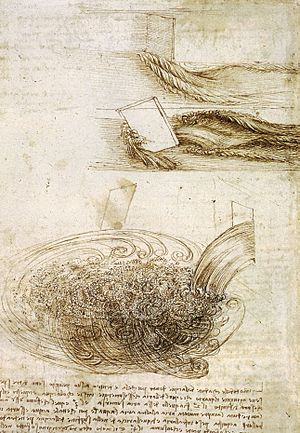Fluid mechanics facts for kids

| Mechanics | ||||||||||

|
||||||||||
Fluid mechanics is a super cool science that looks at how fluids move and what forces act on them. Think of fluids as anything that can flow, like liquids (water, juice) and gases (air, steam).
This field of study helps us understand everything from how a boat floats to how an airplane flies. It's used in many areas, like designing cars, building bridges, and even understanding weather patterns.
Fluid mechanics is split into two main parts:
- Fluid statics: This is about fluids that are not moving. It helps us understand things like how pressure works in water or how a hot air balloon stays up.
- Fluid dynamics: This is about fluids that are in motion. It explains why a river flows fast in some places and slow in others, or how wind moves around buildings.
People have been studying fluids for a very long time! Back in ancient Greece, a famous scientist named Archimedes started figuring out how things float. But even today, scientists are still discovering new things about how fluids behave. It can be a very tricky subject, sometimes needing powerful computers to solve complex problems. This special computer-based way of solving problems is called Computational Fluid Dynamics (CFD).
Contents
What are Fluids?
Fluids are materials that can flow and change their shape to fit any container they are in. Unlike solids, which have a fixed shape, fluids don't have a set shape of their own.
Think about it:
- Water in a glass takes the shape of the glass.
- Air in a balloon takes the shape of the balloon.
This ability to flow and change shape is what makes fluids so interesting to study!
How Fluids Behave
Fluids can behave in different ways. Some fluids, like water or air, are called Newtonian fluids. They flow in a pretty predictable way.
Other fluids are called Non-Newtonian fluids. These are a bit weirder! Their flow can change depending on the forces acting on them. For example, ketchup is a non-Newtonian fluid; it's thick in the bottle but flows easily when you shake it. Another example is cornstarch mixed with water, which can act like a liquid when you pour it, but like a solid if you hit it hard.
Why is Fluid Mechanics Important?
Understanding fluid mechanics is super important for many real-world things:
- Engineering: Engineers use fluid mechanics to design airplanes, cars, ships, and even roller coasters! They need to know how air flows around vehicles to make them go faster or be more fuel-efficient.
- Weather: Meteorologists (weather scientists) use fluid mechanics to understand how air and water move in the atmosphere, which helps them predict weather patterns and storms.
- Medicine: Doctors and scientists use it to understand how blood flows through our bodies and how medicines move through our systems.
- Sports: Athletes and coaches use it to understand how to make a golf ball fly farther or how a swimmer can move faster through water.
It's a field that helps us understand the world around us, from the smallest drop of water to the biggest ocean currents.
Related Pages
See also
 In Spanish: Mecánica de fluidos para niños
In Spanish: Mecánica de fluidos para niños
 | Sharif Bey |
 | Hale Woodruff |
 | Richmond Barthé |
 | Purvis Young |

